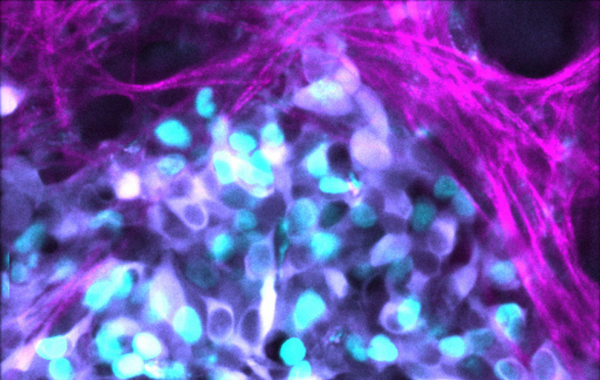According to a recent study done by the Garvan Institute of Medical Research, cancer cells have an inbuilt unpredictability in their capacity to respond to chemotherapy, which is another tool in their armory for fighting treatment.
 Neuroblastoma cells (cyan) growing as a tumor and the surrounding collagen matrix (magenta). Image Credit: Garvan Institute for Medical Research
Neuroblastoma cells (cyan) growing as a tumor and the surrounding collagen matrix (magenta). Image Credit: Garvan Institute for Medical Research
Understanding why certain tumor cells develop resistance to chemotherapy is a real concern in cancer research, given chemotherapy remains a frontline treatment for the majority of tumors.
The latest study indicates that tumor cells from neuroblastoma, a cancer that originates in the body’s “fight or flight” sympathetic nervous system, can switch between responding to chemotherapy and not reacting to it.
We showed there is ‘noise’ in the process of cell death, which is what happens to cancer cells after chemotherapy treatment—and that this inherent noise, or randomness, in the system of gene expression is an important aspect of chemoresistance.”
David Croucher, Associate Professor and Head, Network Biology Lab, Garvan Institute of Medical Research
Around 15% of individuals with neuroblastoma do not respond to chemotherapy.
Our findings suggest that genetics don’t account for everything; other layers of regulation and other mechanisms of tumor progression can also underpin drug response, so we need to consider them.”
Dr Sharissa Latham, Study Co-Lead Author and Group Leader, Network Biology Lab, Garvan Institute of Medical Research
The researchers demonstrated that once neuroblastoma cells become resistant to chemotherapy, they cannot be reversed, implying that there is a small window of opportunity for treatment to act on a tumor cell before it becomes resistant.
Croucher added, “Combining chemotherapy with drugs that target this noise within tumors may have the best results as a first-line treatment after diagnosis, before tumors lock into a state of resistance.”
The traditional approach for cancer clinical trials, in which a new drug is offered to patients who have exhausted all previous treatment choices, is flipped on its head.
Science Advances published this new study.
Noise in the tumor system
The researchers employed mathematical modeling to reduce the “noise” signals in cell death pathways in neuroblastoma tumors. Scientists then used this to patient cell samples, looking at single cells en masse to visually separate the cells that did not react to the therapy.
They discovered a resistance marker—a set of proteins that contribute to the process of cell death known as apoptosis.
Dr Latham added, “We wanted to figure out what underlies that randomness. What is it about those cells and can anything be manipulated to make them respond.”
The researchers discovered certain types of approved medicines that can be employed in conjunction with chemotherapy to stabilize the expression of the genes involved in cell death or by altering the inherent threshold that could tip a tumor cell into a resistant state.
The next phase involves advancing the project forward to a clinical trial.
Source:
Journal reference:
Hastings, J. F., et al. (2023). Memory of stochastic single-cell apoptotic signaling promotes chemoresistance in neuroblastoma. Science Advances. doi.org/10.1126/sciadv.abp8314